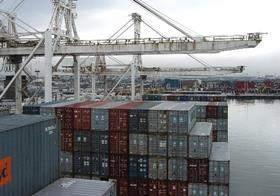
Concerns have been raised over new security controls due to be introduced for container shipments of fresh produce to the European Union next month.
Starting in January, exporters will be required to provide the EU authorities with full details of every container they ship to the EU no less than 24 hours prior to the vessel being loaded.
As a result, full documentation for an individual vessel will apparently need to be available five days earlier than in the past.
“Fruit which in the past could have been packed on a Friday and Saturday for delivery to the vessel on Saturday night, in time for departure on Sunday, will now miss the vessel,” commented one South African logistics operator. “In the early season, where there are no mid-week sailings, this fruit will only depart eight days later.”
The new legislation effectively brings to an end direct loading, the practice of bringing containers to the quayside the day before departure and after stacks for a particular vessel have already closed. Insiders predict this will have a major impact on sensitive products such as stonefruit, which don’t have the shelf-life to withstand delays.
Robbie Robertson of the PPECB said the South African industry was seeking to minimise the legislation’s impact on fruit exports.
“We called interested parties together some time ago and it is clear the legislation will have a major effect on how we handle containers,” he told Eurofruit.
Delena Engelbrecht, CEO of perishable logistics provider GoReefers, said her company was working with clients to see how the five-day cut-off can be reduced.
“It will take careful planning, but there is very little we can do,” she said. “It is a matter for the government to take up with the European authorities because this is one sector which may be dramatically affected.”
Exporters not only argue fruit will arrive later, with reduced shelf-life, but that arriving in the market one week later during the early to middle part of the season could mean a price reduction of around €1 per carton.
Lower returns back on the farm would be a potentially devastating blow for the South African export industry, which has already been hit hard by negative exchange rates.



